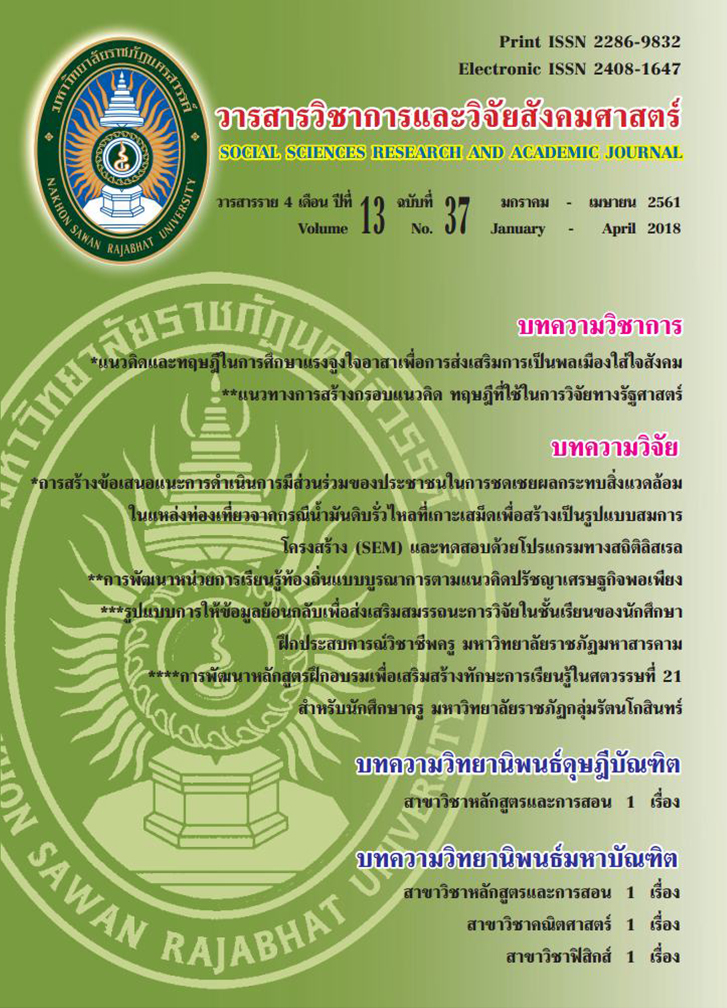การพัฒนาผลสัมฤทธิ์ทางการเรียนตามกรอบมาตรฐานคุณวุฒิระดับอุดมศึกษา โดยการใช้รูปแบบการเรียนการสอนวิชาศึกษาทั่วไปที่ส่งเสริม ความสามารถในการแก้ปัญหาอย่างสร้างสรรค์ The Development of Achievement for Thailand Qualifications Frameworks of Using the Instructional Model on General Education for Enhancing the Creative Problem Solving (CPS) Abilities
Main Article Content
Abstract
The purposes of this research were to compare of achievement for Thailand qualifications frameworks of students through the instructional model on general education for enhancing the creative problem solving abilities and conventional Methods. Sampling group of this research consisted of 30 students majoring in Home Economics as the experimental group and 30 students majoring in Business Computer as the control group. The instruments consist of plan of learning management for enhancing the creative problem solving abilities and the achievement for Thailand qualifications frameworks test. The results of the study reveal that: The learning achievement of the group of students who were taught through this instructional model was higher than those who participated in regular class with the statistical significance at .01 level.
การวิจัยครั้งนี้มีจุดมุ่งหมายเพื่อเปรียบเทียบผลสัมฤทธิ์ทางการเรียนตามกรอบมาตรฐานคุณวุฒิระดับอุดมศึกษาของนักศึกษาที่เรียนด้วยรูปแบบการเรียนการสอนวิชาศึกษาทั่วไปที่ส่งเสริมความสามารถในการแก้ปัญหาอย่างสร้างสรรค์กับแบบปกติ กลุ่มตัวอย่างที่ใช้ในการวิจัยในครั้งนี้ คือ นักศึกษาสาขาวิชาคหกรรม จำนวน 30 คน เป็นกลุ่มทดลอง และนักศึกษาสาขาวิชาคอมพิวเตอร์ธุรกิจ จำนวน 30 คน เป็นกลุ่มควบคุม เครื่องมือที่ใช้ในการวิจัย คือ แผนการจัดการเรียนรู้ที่ส่งเสริมความสามารถในการแก้ปัญหาอย่างสร้างสรรค์ และแบบทดสอบวัดผลสัมฤทธิ์ทางการเรียนตามกรอบมาตรฐานคุณวุฒิระดับอุดมศึกษา ผลการวิจัย พบว่า ผลสัมฤทธิ์ทางการเรียนตามกรอบมาตรฐานคุณวุฒิระดับอุดมศึกษาของนักศึกษาที่สอนด้วยรูปแบบการเรียนการสอนวิชาศึกษาทั่วไปที่ส่งเสริมความสามารถในการแก้ปัญหาอย่างสร้างสรรค์สูงกว่านักศึกษาที่ได้รับการสอนวิชาศึกษาทั่วไปแบบปกติ อย่างมีนัยสำคัญทางสถิติที่ระดับ .01
Article Details
References
คชากฤษ เหลี่ยมไธสง. (2554). การพัฒนารูปแบบการเรียนการสอนบนเว็บแบบผสมผสานโดยใช้กระบวนการแก้ปัญหาอย่างสร้างสรรค์เพื่อพัฒนาความคิดสร้างสรรค์และการคิดแก้ปัญหาของนิสิตระดับอุดมศึกษา. วิทยานิพนธ์ปรัชญาดุษฎีบัณฑิต (หลักสูตรและการสอน).มหาวิทยาลัยมหาสารคาม, มหาสารคาม.
ธัญญาพร ก่องขันธ์. (2558). รายงานการวิจัยการศึกษาสภาพ ปัญหา และความต้องการในการจัดการเรียนการสอนวิชาศึกษาทั่วไปเพื่อส่งเสริมความสามารถในการแก้ปัญหาอย่างสร้างสรรค์ของนักศึกษา. พิษณุโลก: คณะครุศาสตร์ มหาวิทยาลัยราชภัฏพิบูลสงคราม.
ธีรวุฒิ เอกะกุล. (2549). การวัดเจตคติ. อุบลราชธานี: วิทยาออฟเซทการพิมพ์.
สมบัติ ท้ายเรือคำ. (2551). ระเบียบวิธีวิจัยสำหรับมนุษยศาสตร์และสังคมศาสตร์. กาฬสินธุ์ : ประสานการพิมพ์.
สำนักงานการอุดมศึกษา. (2556).ข้อเท็จจริงเกี่ยวกับกรอบมาตรฐานคุณวุฒิระดับอุดมศึกษา. สืบค้นวันที่ 21 สิงหาคม 2558 จาก www.mua.go.th/users/tgf-hed
Astin, A.W. (1993). What Matters in College?. San Francisco: Jossey – Bass.
Cronbach, Lee J. 1970. Essentials of Psychological Testing. 3d ed. New York : Harper &Row, Inc.
Guilford, J.P. (1973). Traits Creativity. Creativity. Penguin Education. : 167-188.
Joyce, B. Weil, M. (2004). Model of teaching (5 ed.). Englewood Cliffs, N.J.: Prentice-Hall.
Osborn. A.F. (1963). Applied Imagination. New York: Scribner.
Schiever, S.W. (1986). The effect of Two Teaching/Learning Model on the HigherCognitive Processes of Students in Classes for the Gifted (Parnes CPS, TABA). Dissertation Abstracts International. Retrieved September 9, 2015, from https://thailis.uni.net.th/dao/detail.nsp
Singhanat Nomnian. (2010). Constructivism : Theory and Its Application to Language Teaching. Retrieved September 9, 2015, from https://www.sc.mahidol.ac.th/sclg/sllt/Constructivism__singhanart_.pdf >18 Feb.
Torrance, E.P. (1962). Guiding creative talent. Englewood Cliffs, NJ: Prentice-Hall.


